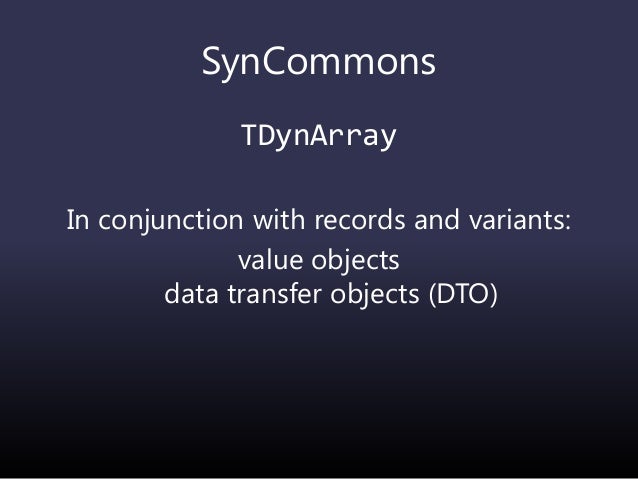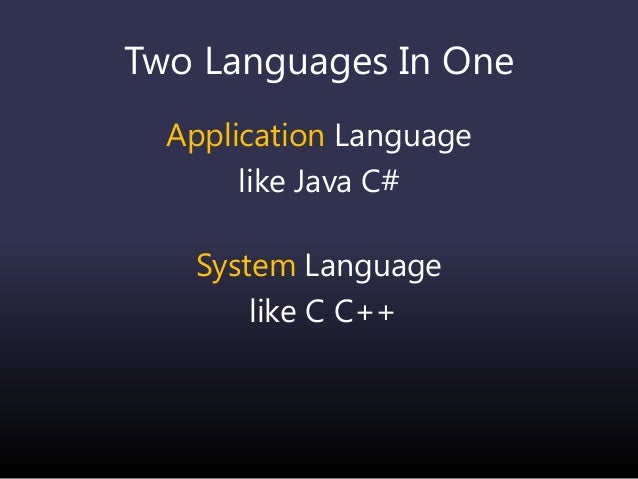Delphi Serialize Variant
I am programing an object serializer that unses RTTI in Delphi 7 and has the following functionality: it backups the state of every published property so they can be restored later through this serializer. It also transform the objecto to an XML string and Vice-Versa. The thing is this. I want to serialize an object A wich has a reference.
Robert Love has an extensive series of articles on the new RTTI. Delphi 2010 RTTI - The basics. Using Attributes and TCustomAttributes descendants. Exploring TRTTIType in depth.
Introduction to TValue. Exploring TRttiMember Descendants in depth (part 1) Properties and Fields. Why I call TRttiContext.Create and TRttiContext.Free. Exploring TRttiMember Descendants in depth (part 2) Properties and Fields. TValue in Depth. INI persistence the RTTI way. Xml Serialization - Basic Usage.
Xml Serialization - Control via Attributes.
This time, you'll see some more ideas for class helpers + learn when to and when not to use class helpers. Class Helper For.In simple words, a class helper is a construct that extends a class by introducing new methods in the helper class. A class helper allows you to extend existing class without actually modifying it or inheriting from it.
To extend the VCL's TStrings class you would declare and implement a class helper like the following: type TStringsHelper = class helper for TStrings public function Contains( const aString: string): boolean; end; The above class, called 'TStringsHelper' is a class helper for the TStrings type. Note that TStrings is defined in the Classes.pas, a unit that is by default available in the uses clause for any Delphi form's unit, for example. The function we're adding to the TStrings type using our class helper is 'Contains'.
Delphi Variant Null
The implementation could look like. Having the TStringsHelper implemented, and a list box on a form (named 'ListBox1'), you can now check if some string is a part of the list box Items property by using: if ListBox1.Items.Contains('some string') then. Class Helpers Go and NoGoThe implementation of class helpers has some positive and some (you might think of) negative impacts to your coding. In general you should avoid extending your own classes - as if you need to add some new functionality to your own custom classes - add the new stuff in the class implementation directly - not using a class helper.
Class helpers are therefore more designed to extend a class when you cannot (or do not need to) rely on normal class inheritance and interface implementations. A class helper cannot declare instance data, like new private fields (or properties that would read/write such fields).
Delphi Serialize Variant Download
Adding new class fields is allowed. A class helper can add new methods (function, procedure). Before Delphi XE3 you could only extend classes and records - complex types. From Delphi XE 3 release you can also extend simple types like integer or string or TDateTime, and have construct like: var s: string; begin s:= 'Delphi XE3 helpers'; s:= s.UpperCase.Reverse; end; I'll write about Delphi XE 3 simple type helper in the near future. Where's MY Class HelperOne limitation to using class helpers that might help you ' ' is the fact that you can define and associate multiple helpers with a single type.

:fill(FFCC00,1)/GettyImages-117228829-57bb5b6d5f9b58cdfd27b1f5.jpg)

However, only zero or one helper applies in any specific location in source code. The helper defined in the nearest scope will apply.
Class or record helper scope is determined in the normal Delphi fashion (for example, right to left in the unit's uses clause). What this means is that you might define two TStringsHelper class helpers in two different units but only one will apply when actually used! If a class helper is not defined in the unit where you use its introduced methods - which in most cases will be so, you do not know what class helper implementation you would actually be using. Gajic, Zarko. 'Understanding Delphi Class (and Record) Helpers.' ThoughtCo, Sep.
18, 2012, thoughtco.com/understanding-delphi-class-and-record-helpers-1058281. Gajic, Zarko. (2012, September 18). Understanding Delphi Class (and Record) Helpers. Retrieved from Gajic, Zarko. 'Understanding Delphi Class (and Record) Helpers.'
(accessed January 5, 2018).